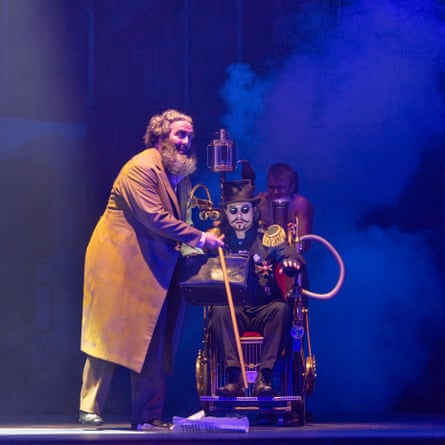An opera about Karl Marx? A comic opera about Karl Marx? Jonathan Dove has never been afraid to think outside the box, and his new piece, premiered at the Theater Bonn, does so again. Marx in London is set on a single day in 1871. It depicts the financial and sexual tangles of the middle-class émigré Marx household in London’s Kentish Town against the backdrop of his political squabbles and his efforts to get Das Kapital finally written.
If you are expecting an opera about dialectical materialism or the labour theory of value you will be disappointed. Dove’s opera, with a witty libretto by Charles Hart, is a genuine comedy, although in Jürgen Weber’s production it’s not without its underlying political messages. It is above all an operatic entertainment, and is full of reminders of why, according to a recent survey, Dove is the third-most performed living opera composer after Philip Glass and Jake Heggie. If London theatregoers find some echoes of Richard Bean’s recent play Young Marx, that’s because Dove and Bean began discussing the project before heading in different directions with it.

Strip away the fact that this is a work about an immense historical and intellectual figure and what you find is a very familiarly constructed opera. It is centred on a troubled baritone central character Marx, who writes about money but is hopeless with it, his neglected and high-born soprano wife Jenny, a put-upon housekeeper mezzo Helene, a vibrant coloratura soprano daughter Tussi and an ardent young tenor suitor Freddy. These are all common operatic archetypes. There’s even a recognition scene in the second act that is straight out of the Marriage of Figaro, when the tenor turns out to be the son of the baritone and the mezzo.
Dove’s opera is, on one level, about a bourgeois family. But this family affair rests on the backs of a working class that, in this production, is always a looming and oppressed presence – shades of Wagner’s Nibelungs – and which, at the final curtain, is poised to take its revenge. Marx gets one big political scene, when he falls asleep in the British Museum and dreams of a chorus of workers rising up. But this is not a socialist realist or agitprop opera – at one point, Marx turns to his collaborator and plaintively asks: “Oh, Engels, whenever will we win?”

Dove’s score is bright, rhythmically insistent and pacy. It sags occasionally, but there is much richly challenging writing for the orchestra under the excellent David Parry, and the confidently written ensembles, which have occasional echoes of Glass, are often very fine. Mark Morouse captures both the prophetic and the petty aspects of the central character very effectively and Jenny Marx receives a performance of distinction from Yannick-Muriel Noah. Dove lavishes some of his most ambitious vocal writing on the Marxes’ daughter and is rewarded with an unflaggingly vibrant performance by the engaging Marie Heeschen. Christian Georg as Freddy, Marx’s illegitimate son, Ceri Williams as his mother and Johannes Mertes as Engels complete a strong group of principals. David Fischer sings the spy from a vertiginous and anachronistic flying machine that intermittently hovers above the busy staging. The production will be shared with Scottish Opera, probably in 2020.
